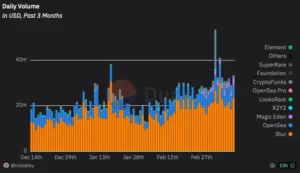NFT Regulation: US Government Says Intellectual Property Laws “Sufficient”

Current U.S. IP and copyright laws are "adequate" for NFTs.
- Copyright and intellectual property laws are currently suitable for NFTs
- A desire to not stifle innovation overshadows concerns over IP rights.
- NFT trading volumes are presently rising across major marketplaces.
A 112-page long US government study into how non-fungible tokens (NFTs) fit into current intellectual property and copyright laws has found NFTs don’t require any specific rules or regulations.
The report, issued by the US Copyright Office and the US Patent and Trademark Office (USPTO), says existing laws are adequate for the tokens. As a result, it claims that no new changes are necessary at this time.
Current Laws “Adequate”
Following a request by two Senators in June 2022, the Offices were tasked with creating a comprehensive study into the “current and future applications” of NFTs. They also tested how intellectual laws apply to the images and associated assets. The report also noted other challenges surrounding the tokens.
The report notes that they entered into numerous discussions with stakeholders and members of the public, through public notices. The offices also hosted three public roundtables. It said:
“The Offices received input from a broad spectrum of commenters, including creators, brand owners, innovators, entrepreneurs, technologists, academics, industry associations, and intellectual property practitioners.”
In conclusion, the offices say they believe changes to intellectual property laws, nor to the Offices’ practices, are not required. It also says changes are not “advisable at this time”.
The report notes that commentary from the public and stakeholders had concerns that NFT-specific legislation would have been “premature”, and potentially stifle innovation in the space as it is still a relatively nascent and emerging technology.
IP Infringement Issues
The report said the most common concerns raised through their public consultations were issues of IP and trademark infringements, and their rights when created or transferred. Due to there being very few trading standards when it comes to NFT marketplaces, IP and trademark infringements remain a common issue within the space.
Acknowledging the efforts of some platforms that have developed tools to ensure that “trademark owners can enforce their right”, it notes that decentralization and a lack of cross-platform protocols to settle disputes make it nearly a singular authority to enforce rules on the entire NFT ecosystem.
Regardless, study respondents were against NFT-specific laws to remedy these concerns. However, they seem to have faith in the evolution of the technology.
“Trademark applicants, registrants, and practitioners need guidance regarding obtaining and enforcing trademark registrations in the context of NFTs. The USPTO has provided guidance on these issues and will continue to work with stakeholders to identify additional needs.”
NFT Trading Volumes Up
Since their explosion into the mainstream in 2021, NFTs have been embroiled in scandal. Indeed, they have often found themselves under fire for being expensive downloadable images, often called “worthless” or “useless”.
But the NFT market is far from dead. According to data from Dune , NFT marketplaces are recording an uptick, with daily volumes in the tens of millions.

With the introduction of new technology, Bitcoin’s very own NFTs by way of Ordinals, and a renewed interest in crypto overall, things are looking up for the tokens.
The drive to give NFTs utility beyond the blockchain is well underway. Real-world use cases are likely to be the most transformative for the asset class.
Perhaps, the conclusion from the Offices is that current rules and regulations on copyright and intellectual property could soon bring accountability and transparency to the NFT space.


